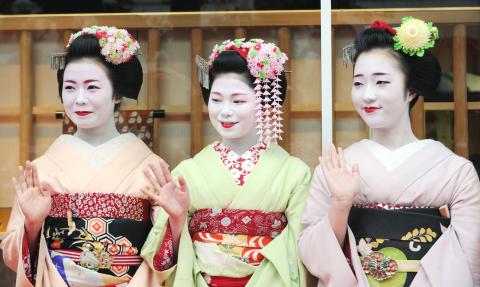Trainee Japanese geishas wearing colorful kimonos and with full-face makeup were out on the streets of Tokyo on Friday, drumming up tourist custom for the ancient capital of Kyoto.
The five maikos, all aged from 16 to 20, met passers-by and handed out leaflets proclaiming historic Kyoto, 500km to the west of Tokyo, is alive and kicking, despite a recent lashing by a typhoon that swamped sightseeing spots.
The women, whose hair was elaborately held up with delicate pins carved in the shape of flowers to reveal their necklines, used the broad Kyoto dialect to greet Tokyoites hurrying past under leaden autumn skies.

Photo: AFP
Despite Western misconceptions, geishas are not prostitutes, but rather entertainers highly skilled in traditional Japanese dance, musical instruments and games.
Throughout history, wealthy and powerful men have spent time with geisha — the word means “artist” — who are rigidly schooled in the art of conversation and bound by strict rules of confidentiality.
High-flying politicians and businesspeople continue to strike sensitive deals in the presence of geishas, paying hundreds or even thousands of dollars for an evening of entertainment and discretion.
In ancient Kyoto — the capital of Japan until 1868 — girls would be raised in geisha houses, where they were coached from a young age in the many skills required.
Nowadays, girls begin their training when they leave school, with recent popular novels and television dramas boosting the number of applicants for a small number of openings.
Successful trainees must submit to an austere regime of training in the arts, as well as doing their part in cooking and cleaning for the rest of the house.
“I wanted to become a maiko when I saw the life of a maiko in a TV documentary when I was in elementary school,” said Ichimari one of the apprentice geishas, 18, who is known by her adopted name. “I enjoy every day of my life.”
Tomitae, 18, said she had been fascinated by the beauty of kimonos since childhood.
“I also wanted to become accomplished in traditional arts,” she said. “I feel happy this way.”
The maiko in Tokyo on Friday will become full-fledged geisha when they have mastered the art forms they are being schooled in.

Four people jailed in the landmark Hong Kong national security trial of "47 democrats" accused of conspiracy to commit subversion were freed today after more than four years behind bars, the second group to be released in a month. Among those freed was long-time political and LGBTQ activist Jimmy Sham (岑子杰), who also led one of Hong Kong’s largest pro-democracy groups, the Civil Human Rights Front, which disbanded in 2021. "Let me spend some time with my family," Sham said after arriving at his home in the Kowloon district of Jordan. "I don’t know how to plan ahead because, to me, it feels

Poland is set to hold a presidential runoff election today between two candidates offering starkly different visions for the country’s future. The winner would succeed Polish President Andrzej Duda, a conservative who is finishing his second and final term. The outcome would determine whether Poland embraces a nationalist populist trajectory or pivots more fully toward liberal, pro-European policies. An exit poll by Ipsos would be released when polls close today at 9pm local time, with a margin of error of plus or minus 2 percentage points. Final results are expected tomorrow. Whoever wins can be expected to either help or hinder the

The collapse of the Swiss Birch glacier serves as a chilling warning of the escalating dangers faced by communities worldwide living under the shadow of fragile ice, particularly in Asia, experts said. Footage of the collapse on Wednesday showed a huge cloud of ice and rubble hurtling down the mountainside into the hamlet of Blatten. Swiss Development Cooperation disaster risk reduction adviser Ali Neumann said that while the role of climate change in the case of Blatten “still needs to be investigated,” the wider impacts were clear on the cryosphere — the part of the world covered by frozen water. “Climate change and

DENIAL: Musk said that the ‘New York Times was lying their ass off,’ after it reported he used so much drugs that he developed bladder problems Elon Musk on Saturday denied a report that he used ketamine and other drugs extensively last year on the US presidential campaign trail. The New York Times on Friday reported that the billionaire adviser to US President Donald Trump used so much ketamine, a powerful anesthetic, that he developed bladder problems. The newspaper said the world’s richest person also took ecstasy and mushrooms, and traveled with a pill box last year, adding that it was not known whether Musk also took drugs while heading the so-called US Department of Government Efficiency (DOGE) after Trump took power in January. In a